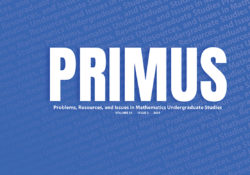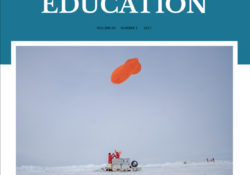eric.ed.gov har udgivet: In December 2015, President Barack Obama signed the Every Student Succeeds Act (ESSA), which replaced No Child Left Behind (NCLB), as the nation’s major law governing public schools. ESSA retains the requirement that states test all students in reading and math in grades three through eight and once in high school, as well as the requirement that states ensure those tests align with states’ college- and career-ready standards. However, the law makes significant changes to the role of tests in state education systems. For example, ESSA requires states to include a broader set of factors in school accountability systems rather than just test scores; provides funding for states and districts to audit and streamline their testing regimes; and allows states to cap the amount of instructional time… Continue Reading →
Like this:
Like Loading...
eric.ed.gov har udgivet: The third conference on improving mathematics and science assessment brought together more than 550 educators, researchers, and policymakers. Recommendations and information from the conference are incorporated into this report. Conference consensus was that students must recognize that there is more to assessment than grades and scores and begin to see assessment as a crucial and integral part of education. They should assume increasing responsibility for documenting and reflecting on their own progress as they move through school. Parents and the public must hold high expectations for instruction and for student participation. Teachers will hold all students, regardless of their backgrounds, to high standards and will recognize that assessment cannot be separated from learning. Principals and other administrators must oversee the reform of mathematics and science assessment and… Continue Reading →
Like this:
Like Loading...
tandfonline.com har udgivet en rapport under søgningen “Teacher Education Mathematics”: Abstract Several major themes related to rethinking assessment emerged from a search of the papers published in PRIMUS. Authors explored ways to change the stakes of assessments, often with outcomes-based grading and testing structures. They explored changing the structure of assessments by considering media beyond written exams and by configuring them as group activities. They explored ways to change the focus of their assessments by asking students to synthesize and engage messy applications/projects and by making metacognition part or all of the assessment activities. And they explored issues around assessment as part of a larger system by considering approaches to grading in general, alignment with other course activities, workload, and perceptions and expectations about assessment in mathematics. In this PRIMUS… Continue Reading →
Like this:
Like Loading...
tandfonline.com har udgivet en rapport under søgningen “Teacher Education Mathematics”: Abstract Abstract This first analysis of aggregated data from the Kahoot! game-based player response system demonstrates that it can provide assessments of overall US student polar knowledge and identifies differences in polar knowledge across several states. A kahoot online quiz on polar topics recorded over 25,000 United States teacher-hosted classroom players (mostly middle-high school students) run by 1,167 unique teacher hosts within nine months (09/2018 through 06/2019). This high volume of teacher-initiated kahoots shows that many US teachers are motivated to include polar content in their teaching. We selected a subset of questions for analysis to compare with external data from a 2016 survey assessing polar knowledge of the US adult public. On three directly comparable questions kahoot student accuracy… Continue Reading →
Like this:
Like Loading...
eric.ed.gov har udgivet: The development of an assessment tool to measure the quality of instruction is necessary to provide an informative accountability system in education. Such a tool should be capable of characterizing the quality of teaching and learning that occurs in actual classrooms, schools, or districts. The purpose of this paper is to describe the development of the Academic Rigor in Mathematics (AR-Math) rubrics of the Instructional Quality Assessment Toolkit and to share the findings from a small pilot study conducted in the Spring of 2003. The study described in this paper examined the instructional quality of mathematics programs in elementary classrooms in two urban school districts. The study assessed the reliability of the AR-Math rubrics, the ability of the AR-Math rubrics to distinguish important difference between districts, the… Continue Reading →
Like this:
Like Loading...
tandfonline.com har udgivet en rapport under søgningen “Teacher Education Mathematics”: ABSTRACT ABSTRACT This article is based on studies carried out within the Young children’s learning research education programme. This undertaking involved five graduate students, all recruited from the Swedish preschool system. The licentiate thesis makes up the final product of their education programme, and the focus of each candidate’s licentiate thesis was preschool-level documentation. Using the results of all five theses, a re-analysis was conducted with the concept of normality as the common starting point. The purpose was to investigate whether documentation and assessment can change the view of normality in preschools, and furthermore, what consequences there may be for preschool activity. ‘The narrow preschool and the wide preschool’ is the model used to support the analysis, which is a… Continue Reading →
Like this:
Like Loading...
eric.ed.gov har udgivet: Maryland’s demanding new Kindergarten Readiness Assessment was administered statewide for the first time. Its results are revealing and sobering. Many states do not even check in any systematic way on their children’s readiness for kindergarten, and in previous years, Maryland used metrics based on modest expectations, outdated standards, and feel-good politics. With the leadership of State Superintendent Lillian Lowery and Assistant Superintendent Rolf Grafwallner, Maryland has brought a new sense of reality to the skills that five-year-olds should possess if they are truly prepared to succeed in kindergarten and the early grades. These span four domains, two of them cognitive (language, math), plus physical well-being (motor development, hygiene, etc.) and what they term “social foundations” (self-control, for example). The assessment is individually administered by kindergarten teachers and… Continue Reading →
Like this:
Like Loading...

tandfonline.com har udgivet en rapport under søgningen “Teacher Education Mathematics”: ABSTRACT ABSTRACT The main aim of this study was to investigate how Finnish pre-service special needs teachers’ (N = 134) assessment conceptions, prior academic studies in special education and teaching experience together cluster into different patterns representing different student types. Their assessment conceptions formed three main factors: 1) assessment measures learning, 2) assessment supports teaching and learning, and 3) assessment as a harmful action. All three factors were emphasised differently in each pattern. Assessment conceptions, prior studies, and teaching experience were clustered together in three different patterns: Assessment Criticals, Assessment Positives, and Assessment Cautious. The Assessment Criticals emphasised assessment as a harmful action, and they had fewer prior studies and less teaching experience. The Assessment Positives emphasised assessment for teaching and learning,… Continue Reading →
Like this:
Like Loading...
eric.ed.gov har udgivet: An intervention project by Teacher Corps interns in an elementary school was designed to improve student performance in mathematics. Activities carried out by the interns included: (1) construction of a school facade replica reflecting student achievement of identified math curriculum objectives, kindergarten through sixth grade; (2) preparation and presentation of a mathematics unit and study involving use of calculators by fifth-grade students and provision of special mathematics activities for accelerated sixth-grade students; (3) operation of a “Math Hotline” one evening per week to assist students and parents with homework; (4) preparation of mathematics activities and materials for interested students during lunch periods; and (5) planning and conducting a week of special events designed to enhance school spirit, in general, and student and staff motivation in math, in… Continue Reading →
Like this:
Like Loading...
eric.ed.gov har udgivet: Between 2000 and 2009, the Hispanic population more than doubled in 25 of 67 Pennsylvania counties. Over the same period, the Hispanic student population in Pennsylvania schools also rose, from 4 percent to 8 percent (Pennsylvania State Data Center 2011). The focus on Hispanic students’ level of academic achievement rose along with this rapid population growth. Recent research reveals that, although the achievement gap between ethnic subgroups at the national level has been shrinking over the past five years, the gap remains wide (Aud et al. 2010). This is also the case and a matter of concern in Pennsylvania. Research has identified several student-level factors associated with academic achievement among ethnic minority students, including gender and socioeconomic status (Freeman 2004; McGraw, Lubienski, and Strutchens 2006; Pong 2010);… Continue Reading →
Like this:
Like Loading...



